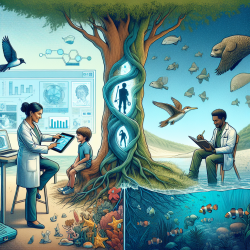Introduction
In the ever-evolving field of speech-language pathology, practitioners are continually seeking innovative ways to enhance their skills and improve outcomes for children. Drawing inspiration from diverse fields can provide unique insights and strategies. One such field is marine capture fisheries, which offers valuable lessons on sustainability and resource management. The research article titled Food Security and Marine Capture Fisheries: Characteristics, Trends, Drivers and Future Perspectives presents findings that can be adapted to speech-language pathology practices.
Understanding the Research
The research by Garcia and Rosenberg (2010) highlights the critical role of marine capture fisheries in global food security. The study discusses the challenges of maintaining sustainable fish stocks amidst environmental degradation, overfishing, and climate change. These challenges are addressed through improved governance, technological advancements, and community engagement. The insights from this research can be applied to speech-language pathology by emphasizing sustainable practices and data-driven decisions.
Implementing Sustainable Practices
Just as fisheries require sustainable practices to ensure long-term viability, speech-language pathologists must adopt sustainable strategies to achieve lasting outcomes for children. Here are some actionable steps:
- Data-Driven Decisions: Utilize data to inform therapy plans and track progress. This approach ensures that interventions are effective and tailored to individual needs.
- Collaborative Approaches: Engage with families, educators, and other professionals to create a supportive network around the child, much like the collaborative governance in fisheries.
- Adaptability: Be open to new techniques and technologies that can enhance therapy outcomes, similar to how fisheries adapt to changing environmental conditions.
Encouraging Further Research
The research on marine capture fisheries underscores the importance of continuous learning and adaptation. Speech-language pathologists are encouraged to engage in ongoing research and professional development to stay abreast of the latest advancements in the field. This commitment to learning mirrors the need for fisheries to adapt to new challenges and technologies.
Conclusion
By drawing parallels between speech-language pathology and marine capture fisheries, practitioners can gain valuable insights into sustainable practices and data-driven decision-making. These strategies not only enhance professional skills but also lead to better outcomes for children. For those interested in exploring the original research paper, please follow this link: Food security and marine capture fisheries: characteristics, trends, drivers and future perspectives.










